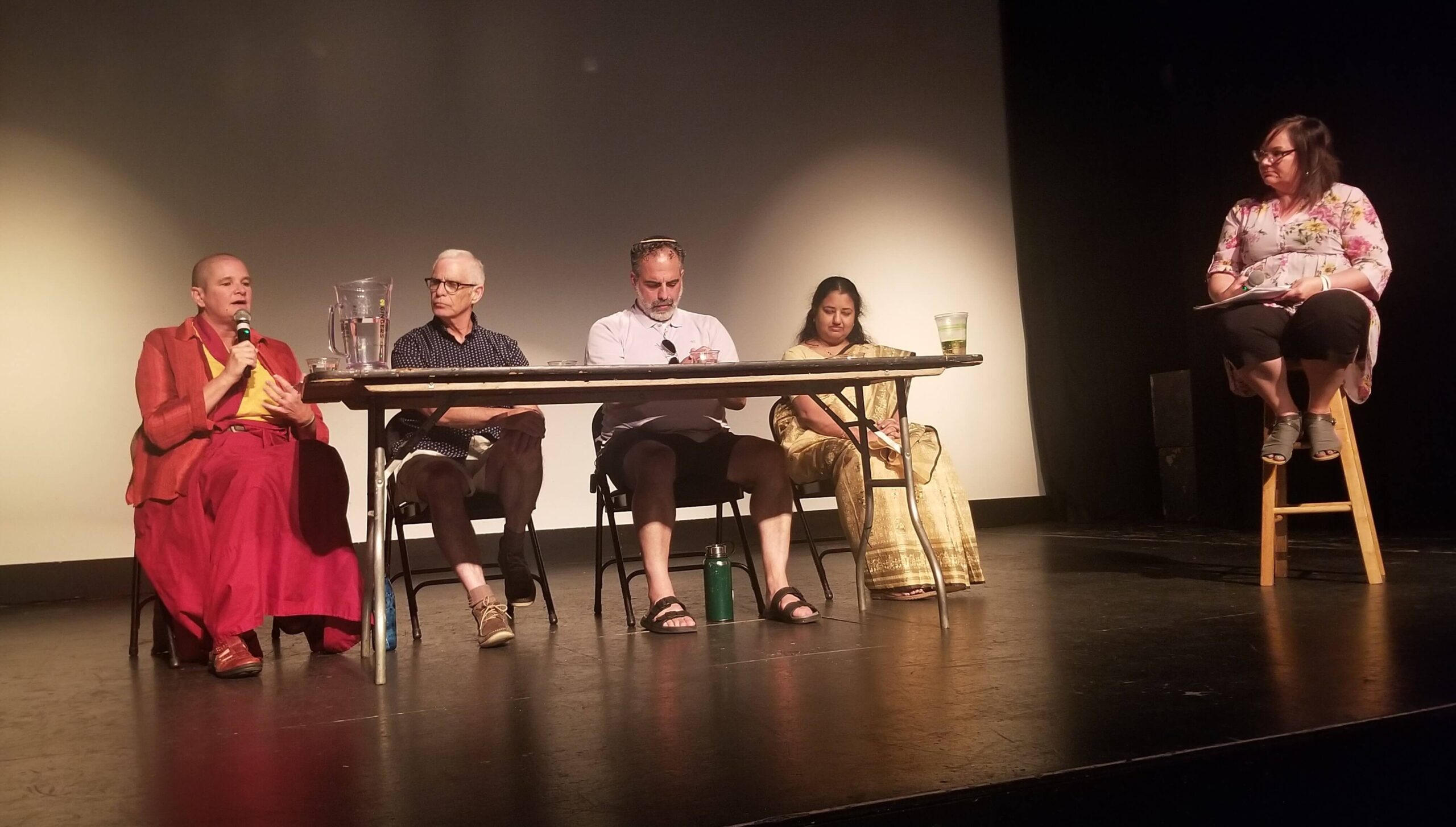“First live a compassionate life. Then you will know,” a quotation from the Buddha, passes across the screen as the film starts.
Thomas Wade Jackson was in Unity of New York – a metaphysical, new-thought church. He had been vegan eight years and happened to see the 2014 documentary Cowspiracy.
Cowspiracy reviewed environmental concerns including water use, deforestation, global warming, and ocean dead-zones. It suggested animal agriculture is the main cause of this planet’s environmental destruction. The Union of Concerned Scientists (UCS) felt that film’s conclusions ran counter to scientific consensus, which laid the blame at the feet of fossil fuel emissions.
Regardless of UCS’ pronouncement, Jackson felt he must do something after seeing Cowspiracy. He began to pray and meditate, and A Prayer for Compassion was the result. The filmmaker studied the teachings of Jesus about kindness and compassion. No one asked him to become a vegan; he became one on his own.
Winnipeg Screening
Winnipeg VegFest organised the screening of A Prayer for Compassion at the Park Theatre on July 23.
Character, scene, costume, photography, and other usual cinematic parameters are irrelevant to this colour documentary. The film consists of clear, crisp interviews with spiritual leaders of various faiths, who argue passionately that the compassion enjoined by spiritual teachers should be extended to non-human animals.
Dr. Will Tuttle, Elaine West, Suzy Welch, and Victoria Moran – a publisher and the documentary’s producer – are just a few of those who speak to the issue in the film.
The Philosophy of A Prayer for Compassion
Jackson is of the view that people should go back to the original teachings of compassion, whatever religion they may profess to follow. They should consume plant-based diets and be stewards of the planet. He would like to see local interfaith groups to get the conversation started.
The film shows dietary choices are having an effect on our individual and collective health and karma, positing the question, “Can compassion grow to include all living earthlings?” A related question could be, “How to increase compassion in a world which rewards its opposite?”
Audience Reaction and Discussion
Vanessa Parks, one of the approximately 62-strong audience, said: “What I found most interesting about the film is just how explicitly it is documented within all major religions that our treatment of animals is in clear violation with their respective teachings. Yet somehow, this disobedience seems to be collectively accepted and overlooked. This film reaffirms that a hierarchy among species is fallacious. All sentient beings deserve love. compassion, and our voices when these rights are being withheld.”
Representatives of Christianity, Hinduism, Judaism and Buddhism were invited to the stage after the film.
The Hindu representative felt not hurting any living being, or “ahimsa,” is a core belief of her religion, and that A Prayer for Compassion was a powerful, edifying film.
The Christian pastor said that he was struck by the breadth of spiritual leaders interviewed in the documentary, and its emphasis on industrial-scale meat production. The human tendency is to want to dominate rather than being in a caring, loving relationship; but does “dominion” mean to control? In our time and circumstance, he thought, carnivorous diets are not healthful. Humans like to create hierarchies, though the film disseminates that all earthlings deserve to live happily and naturally.
Inter-faith Veganism Discussions in Winnipeg
Chrissy Novak, Event Coordinator for Winnipeg Vegfest, said: “I was passionate about bringing A Prayer for Compassion to the Winnipeg community because I truly believe that, by honouring God’s creation and creatures with compassion, we are pleasing our Creator. All religions have compassion as their foundation; now, how can we bring this compassion into action for all lives on this planet? This movie tugs at my heart in all the right ways and shows that no matter our beliefs, we all have one thing in common – the ability to feel and act with compassion.”
“The idea of an Inter-Faith Panel was brought to light by the Vegfest committee, and I believe we found a diverse and wise panel to provide clarity and demonstrate that our city is blessed with caring, compassionate leaders who are willing to take action in this area as it only benefits their congregations and communities to be healthier, kinder, and spiritually fulfilled. What is especially exciting is that other spiritual groups, such as the Islamic community, are now communicating (that) they would like to be part of this great discussion. I am working on forums to facilitate the continuation of this conversation.”
Where to Go from A Prayer for Compassion
“The most-asked question I have received since the event is, ‘What do we do next? If I want to actively practice compassion what do I do?,'” said Novak. “Here are a few simple things one can start with:
- Practice the (more good less harm) philosophy – mindful thought before taking action. Ask who or what will be harmed by making this choice, and is what I desire or need worth the harm? Decide to act in a way that aligns with your personal values as much as possible.
- Education – read a non-fiction book on climate science, animal ethics and or health benefits of plant based eating and consider doing it as part of a book club with friends or your spiritual organization.
- Be inclusive – bring plant-based options to social gatherings.
- Eliminate or reduce animal product consumption. There are many wonderful people in Winnipeg and online who will help you find the best way to include more plants in your diet and consumption choices such as clothing and other products.
- Visit, volunteer at or donate to a compassionate charities like a Farm Sanctuary
And most important of all: - Practice Grace – with yourself and with others. We are all on our own journey. God designed us as individuals. Be encouraging, be a coach, and remember humans are animals too. Be kind to each other, regardless of where we are on the path.”
As if to underscore the message, the Winnipeg Free Press editorial of 26 June 2019 said, “Modern society is fundamentally confused about nutrition. That we don’t really know what or how to feed ourselves is not totally our fault, as we navigate a flawed industrialized food system that produces a great many products that are food-adjacent at best – pumped full of processed sugar, salt and additives that are designed to be cheap and addictive, encouraging people to eat large portions and more often.”
The food industry will not like this film.
Ashoke Dasgupta is a freelance journalist and former editor of Compassionate Friend, Beauty Without Cruelty-India's magazine. He won a UNDP - Goethe Institute Award for Environmental Journalism in Nepal 1995, and the Canadian Ethnic Media Association's Best News/Feature Awards for 2004 and 2006. He got a scholarship to study journalism at Sheridan College Toronto in 2007, graduating with high honours. He has done internships at the Winnipeg Free Press and CBC Radio, and been published in the Winnipeg Free Press, the Calgary Herald and the Toronto Star.




